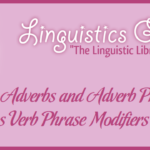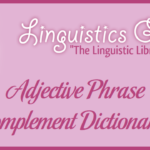Adjective phrase complements are words, phrases, and clauses that complete the meaning of an adjective or adjective phrase. Unlike adjective phrase modifiers that modify or describe an adjective or adjective phrase, adjective phrase complements complete the meaning of an adjective or adjective phrase. Three grammatical forms can function as adjective phrase complements. The three grammatical forms that can function as adjective phrase complements are:
- Prepositional phrase
- Verb phrase
- Noun clause
The following sections explain and provide examples of the three grammatical forms that can function as adjective phrase complements in English grammar.
Prepositional Phrases as Adjective Phrase Complements
The first grammatical form that can perform the grammatical function of adjective phrase complement is the prepositional phrase. A prepositional phrase is defined as a preposition, which is traditionally defined as “a word or words that relates a noun, adjective, or verb to another noun, adjective, or verb,” directly followed by a prepositional complement in the form of a noun phrase, noun clause, verb phrase, or prepositional phrase. For example, the following italicized prepositional phrases function as adjective phrase complements:
- My wife is worried about our financial situation.
- This restaurant is famous for its burgers.
- Many little girls are fond of playing with dolls.
- His neighbor is guilty of breaking his French door window.
- I was disappointed with the service.
- He should be happy about my success.
Verb Phrases as Adjective Phrase Complements
The second grammatical form that can perform the grammatical function of adjective phrase complement is the verb phrase in the form of an infinitive. Verb phrases are defined as phrases that consist of a verb plus any modifiers, complements, particles, infinitive markers, or other verbs. An infinitive phrase consists of the p-word to functioning as an infinitive marker followed by the rest of the verb phrase. For example, the following italicized verb phrases function as adjective phrase complements:
- We are eager to begin the school year.
- He seemed pleased to meet you.
- Some dogs are afraid to ride in cars.
- Canadians are eligible to enter the giveaway.
- I am content to read quietly all afternoon.
- My coworker was nervous to bring up the problem during the meeting.
Noun Clauses as Adjective Phrase Complements
The third grammatical form that can perform the grammatical function of adjective phrase complement is the noun clause. A noun clause is defined as a dependent clause that is formed by a subordinating conjunction directly followed by a clause. The subordinating conjunctions that introduce noun clauses in English are that, Ø, if, whether, wh- words, and wh-ever words. For example, the following italicized noun clauses function as adjective phrase complements:
- The student seemed genuinely sorry that he arrived late for class.
- Chicken Little is worried that the sky is falling.
- The committee is certain that you are not qualified for the position.
- You are fortunate that you were not seriously injured.
- Some patrons are shocked that you cannot borrow an unlimited number of books.
- I am ashamed that you are my sister.
The three grammatical forms that can function as the adjective phrase complement in the English language are prepositional phrases, verb phrases, and noun clauses.
See also Adjective Phrase Complement Dictionary.
Summary
Adjective phrase complements in English grammar are words, phrases, and clauses that complete the meaning of an adjective or adjective phrase.
Adjective phrase complement is a grammatical function.
The grammatical forms that can function as the adjective phrase complement in English grammar are the prepositional phrase, verb phrase, and noun clause.
Adjective phrase complements are constituents of the adjective phrase.
References
Brinton, Laurel J. & Donna M. Brinton. 2010. The linguistic structure of Modern English, 2nd edn. Amsterdam: John Benjamins Publishing Company.
Hopper, Paul J. 1999. A short course in grammar. New York: W. W. Norton & Company.
Huddleston, Rodney. 1984. Introduction to the grammar of English. Cambridge: Cambridge University Press.



